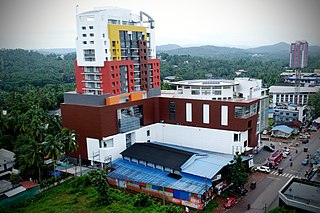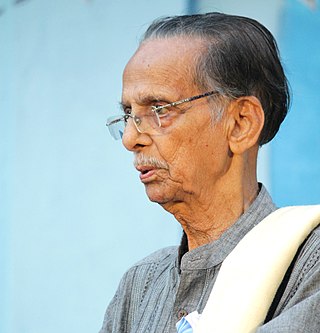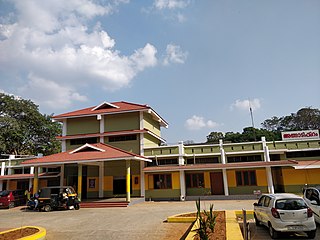
Malappuram, is one of the 14 districts in the Indian state of Kerala, with a coastline of 70 km (43 mi). It is the most populous district of Kerala, which is home to around 13% of the total population of the state. The district was formed on 16 June 1969, spanning an area of about 3,554 km2 (1,372 sq mi). It is the third-largest district of Kerala by area, as well as the largest district in the state, bounded by Western Ghats and Arabian Sea to either side. The district is divided into seven Taluks: Eranad, Kondotty, Nilambur, Perinthalmanna, Ponnani, Tirur, and Tirurangadi.

Valluvanad was an independent chiefdom in present-day central Kerala that held power from the early 12th century to the end of the 18th century. Prior to that, and since the late 10th century, Valluvanad existed as an autonomous chiefdom within the kingdom of the Chera Perumals. The disintegration of the Chera Perumal kingdom in early 12th century led to the independence of the various autonomous chiefdoms of the kingdom, Valluvanad being one of them.
The Malayali people are a Dravidian ethnolinguistic group originating from the present-day state of Kerala in India, occupying its southwestern Malabar coast. They are predominantly native speakers of the Malayalam language, one of the six Classical languages in India. The state of Kerala was created in 1956 through the States Reorganisation Act. Prior to that, since the 1800s existed the Kingdom of Cochin, the Kingdom of Travancore, Malabar District, and South Canara of the British India. The Malabar District was annexed by the British through the Third Mysore War (1790–92) from Tipu Sultan. Before that, the Malabar District was under various kingdoms including the Zamorins of Calicut, Kingdom of Tanur, Arakkal kingdom, Kolathunadu, Valluvanad, and Palakkad Rajas.
The Niranam poets, also known as the Kannassan poets, were three poets from the same family by the names of Madhava Panikkar, Sankara Panikkar, and Rama Panikkar. They hailed from Niranam, a small village in southern Kerala, India, near the town of Thiruvalla. Their works mainly comprised translation and adaptation of Sanskrit epics and Puranic works and were for devotional purposes. They lived between 1350 and 1450 C.E.

Māmānkam or Māmāngam was a duodecennial medieval fair held on the bank, and on the dry river-bed, of Pērār at Tirunāvāya, southern India. The temple associated with the festival was Nava Mukunda Temple in Tirunavaya. It seems to have begun as a temple festival, analogous to the Kumbha Melas at Ujjaini, Prayaga, Haridwar and Kumbakonam.

Kottakkal is a municipal town in Malappuram district in Kerala, southern India having 32 wards. it is a part of Malappuram metropolitan area and a growing city in Kerala. The town is best known for the Arya Vaidya Sala, one of the top Ayurvedic health centres of the world. Kottakkal is also a major growing commercial, educational, and healthcare hub in South Malabar. The town lies on Mumbai–Kanyakumari National Highway 66.

Malabar District, also known as Malayalam District, was an administrative district on the southwestern Malabar Coast of Bombay Presidency (1792-1800) and Madras Presidency (1800-1947) in British India, and independent India's Madras State (1947-1956). It was the most populous and the third-largest district in the erstwhile Madras State. The British district included the present-day districts of Kannur, Kozhikode, Wayanad, Malappuram, Palakkad, Chavakad Taluk and parts of Kodungallur Taluk of Thrissur district, and Fort Kochi area of Ernakulam district in the northern and central parts of present Kerala state, the Lakshadweep Islands, and a major portion of the Nilgiris district in Tamil Nadu. The detached settlements of Tangasseri and Anchuthengu, which were British colonies within the kingdom of Travancore in southern Kerala, also formed part of Malabar District until 1927. Malayalam was the administrative as well as the most spoken lingua franca of Malabar District during British Rule. Jeseri, a distinct dialect of Malayalam, was spoken in the Laccadive Islands. Malabar District merged with the erstwhile state of Travancore-Cochin (1950-1956) to form Kerala according to the States Reorganisation Act, 1956. On the same day, the present Kasaragod district of South Canara District was also attached to Malabar, and the Laccadive & Minicoy Islands of Malabar were reorganised to form a new Union Territory. Malabar was trifurcated to form the districts of Kannur, Kozhikode, and Palakkad, on 1 January 1957.

Kavalam Narayana Panicker was an Indian dramatist, theatre director, and poet. He has written over 26 Malayalam plays, many adapted from classical Sanskrit drama and Shakespeare, notably Kalidasa's Vikramorvasiyam, Shakuntalam (1982), Bhasa's Madhyamavyayogam (1979), Karnabharam, Uru Bhangam (1988), Swapnavasavadattam, and Dootavakyam (1996). He was the founder – director of theatre troupe, Sopanam, which led to the foundation of Bhashabharati: Centre for Performing Arts, Training and Research, in Trivandrum.

Mankada is a hillside village in the Malappuram district of Kerala state. It is located 15 km (9.3 mi) from Malappuram and is part of the Malappuram parliament constituency. The municipal town of Perinthalmanna is just 10 km (6.2 mi) away. Also, the municipal towns of Manjeri and Malappuram are just 15 km (9.3 mi) away. Mankada Kadannamanna Kovilakam was the seat of ruling family of the erstwhile Kingdom of Valluvanad.

Thirumandhamkunnu Temple is a historically significant Hindu temple in Angadipuram, which was the capital of Valluvanad Rajavamsham, in Malappuram district, Kerala state, South India. The temple deity, Thirumandhamkunnil amma, was the paradevatha of the kings of Valluvanad, the local feudal kings ruled the area in the Middle Ages. The Nair warriors of Valluvanad king set out from this temple to Thirunavaya, to participate in the famous Mamankam festival. A memorial structure called the chaver thara can be found in front of the main entrance of the Thirumanthamkunnu Temple.

K. N. Panikkar is an Indian historian, associated with the Marxist school of historiography.
Panicker' was a honorary title conferred by the king of Travancore to distinguished hindu individuals. The panicker is a title given to Martial arts from communities like Saint Thomas Christians, Ezhava, Nair. They were well known as the masters of Kalari tradition, having their Nalpatheeradi Kalari. They are the people who propagated and practised Kalaripayattu, the martial art form of Kerala. The panicker surname is used by a cluster of communities in Kerala, it is to be noted that Kalari panicker shouldn't be confused with the Nair panicker.

Vaniyamkulam is an old town and an important trading hub of Southern Malabar in Kerala state, India, particularly of livestock arriving from the neighbouring state of Tamil Nadu. The name derived from 'Vaniyan', connected with a trading community. It is part of the Palakkad District.

Valanchery is a major town and one of the 12 municipalities in Malappuram district, Kerala, India. It is one of the four municipalities in Tirur Taluk, besides Tirur, Kottakkal, and Tanur. It is situated about 40 kilometres (25 mi) southeast to Karipur International Airport and 25 kilometres (16 mi) southwards to the district headquarters, and forms a part of Malappuram metropolitan area. It is also one of the major commercial towns under the Malappuram urban agglomeration. Valanchery, which was a part of the erstwhile princely state of the Valluvanad in the early medieval period, had been under the direct control of the Zamorin of Calicut following the Tirunavaya war of 14th century CE. During British Raj, Valanchery was included in the Ponnani Taluk of erstwhile Malabar District. Vattapara accident zone is an accident zone near Valanchery. Valanchery is situated on National Highway 66.

Lakkidi or Lakkidi Perur is a small village in Ottapalam Taluk of Palakkad district, Kerala, India. It is located 23 km west of Palakkad on the Palakkad - Pattambi Road. The nearest town is Ottapalam, which is 10 km away. Lakkidi is situated 303 km from the state capital, Thiruvananthapuram. The pin code of Lakkidi Post Office is 679301 and the STD code is 0466.

Angadippuram is a major suburb of Perinthalmanna town, in Malappuram District of Kerala. It was the capital of the powerful medieval kingdom of Valluvanad. Angadippuram is also known for Angadippuram Laterite, a notified go-heritage monument. Angadippuram is famous for its two temples, the Thirumandhamkunnu Temple and the Tali Mahadeva Temple. Kozhikode - Palakkad National Highway 966 passes through the town and Angadipuram Railway Station is one of the major railway station on the Nilambur - Shornur Line of Palakkad Division, Southern Railways. It is connected to major cities Kochi and Thiruvananthapuram through this line.
Putumanna Kandaru Menon (1750–1766) was a Chaver who died during the 1766 Mamankam. At the time of his death, he was 16 years old. During the Mamankam, Menon fought through the warriors of Zamorin and reached the "Nilapatuthara" (stage) and swung his sword at the Zamorin. Kander Menon's songs describe the heroic history of Kandar Menon of Vatonneveet and his son Ithappu, who went to Tirunnavaya and fought against the soldiers of the Samothiri at Mamangam in the year 1683 of year. Kandar Menon and Ithappu who reached the stage on the day of Mamanka and reached the stage by bravely fighting many of the Zamorin army and reached the stage. Unniraman, a soldier of the Samuthir in Madappuram, who saw him approaching the Samuthir, killed Ithapu with a sword. Immediately Kander Menon jumped into the crowd and Nambioli, who was standing in front of Cherai Panicker (Chettuvayi), cut down the doctors and collided with Cherai Panicker, a scholar. Cherai Panicker, who has been pitied many times, had a tough fight with Menon. Before Kander Menon, all the efforts of the builders failed and his hand began to grow weak and limp. That's when Panicker made a fake. It slashed at Menon's thigh, causing Kander Menon to fall to his knees on the floor. Menon, who was about to fall and die, looked at Panicker's Nabi and kicked him before dying.
Perinthalmanna is a major city and municipality in Malappuram district, Kerala, India. It serves as the headquarters of the Perinthalmanna Taluk, and a block and a Revenue Division by the same name. It was formerly the headquarters of Valluvanad Taluk, which was one of the two Taluks in the Malappuram Revenue Division of the erstwhile Malabar District during the British Raj. The town is located 23 kilometres (14 mi) southwest to the city of Malappuram at the centre of the Kozhikode–Malappuram–Perinthalmanna–Palakkad National Highway 966.
Malappuram is one of the 14 districts in the South Indian state of Kerala. The district has a unique and eventful history starting from pre-historic times. During the early medieval period, the district was the home to two of the four major kingdoms that ruled Kerala. Perumpadappu was the original hometown of the Kingdom of Cochin, which is also known as Perumbadappu Swaroopam, and Nediyiruppu was the original hometown of the Zamorin of Calicut, which is also known as Nediyiruppu Swaroopam. Besides, the original headquarters of the Palakkad Rajas were also at Athavanad in the district.

Mamangam (transl. Festival) is a 2019 Indian Malayalam-language period action film directed by M. Padmakumar, and produced by Kavya Film Company. Sajeev Pillai was the director in the first schedule, but was replaced by M. Padmakumar. It stars Mammootty in lead role, with Unni Mukundan, Achuthan and Siddique. The film is about the Mamankam festival of the 18th century in the banks of the Bharathappuzha at Tirunavaya, in the Malabar region. The film follows Chaaverukal who plot to overthrow the Samoothiri.
2. S.Rajendu, The History of Valluvanad, Perintalmanna, 2012












